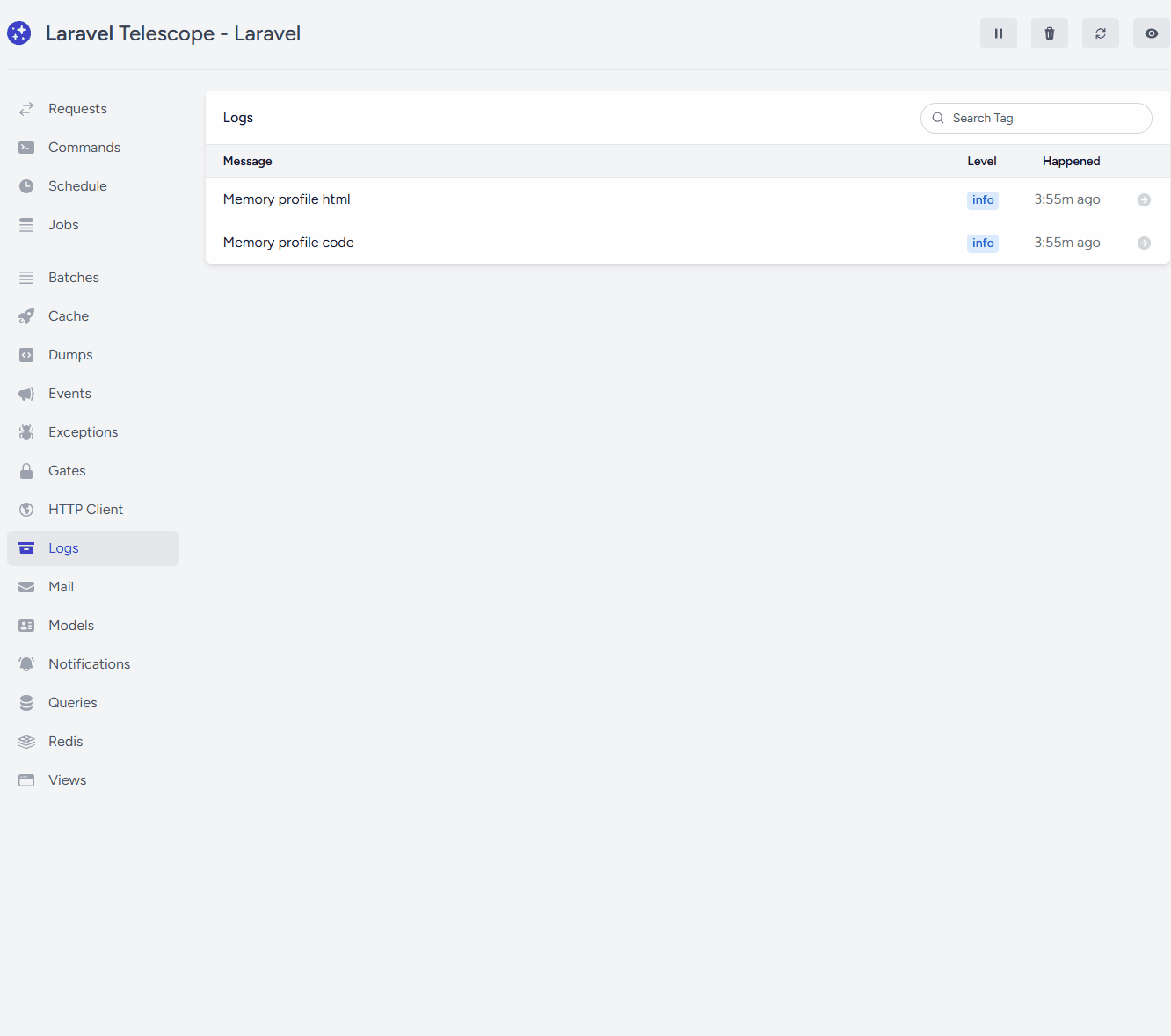phpner / laravel-profiler
Laravel package for measuring and logging memory usage and execution time
Installs: 28
Dependents: 0
Suggesters: 0
Security: 0
Stars: 0
Watchers: 0
Forks: 0
Open Issues: 0
pkg:composer/phpner/laravel-profiler
Requires
- php: >=8.1
- illuminate/support: ^10.0|^11.0|^12.0
Requires (Dev)
- orchestra/testbench: ^9.0|^8.0
- phpunit/phpunit: ^10.3|^11.0|^12.0
README
Measure peak memory and execution time in your Laravel app — for HTTP requests and Artisan commands. Ships with headers, logs, and optional Telescope integration.
Features
- 🔎 Precise metrics: duration (ms), start/end/peak memory and memory diff.
- 🌐 HTTP profiling via middleware + optional response headers:
X-Memory-Peak,X-Duration-ms. - 🧰 Artisan profiling via a simple trait wrapper.
- 🧱 Manual spans (start/stop) via the service or facade.
- 🪵 Pluggable outputs: app log, Laravel Telescope (or both).
- 🎚️ Threshold: only log when peak memory exceeds N bytes.
Requirements
- PHP >= 8.1
- Laravel 10.x / 11.x / 12.x
Installation
composer require phpner/laravel-profiler
php artisan vendor:publish --tag=config --provider="Phpner\\MemoryProfiler\\MemoryProfilerServiceProvider"
This publishes config/laravel-memory-profiler.php.
Quick start
HTTP requests
Register the middleware (global or route group):
// app/Http/Kernel.php protected $middleware = [ // ... \Phpner\MemoryProfiler\Middleware\HttpProfiler::class, ];
When enabled, each request will:
- write a log entry with metrics and request context;
- (optionally) add headers
X-Memory-PeakandX-Duration-msto the response.
Artisan commands
Wrap your command logic with the provided trait:
use Illuminate\Console\Command; use Phpner\MemoryProfiler\Console\Concerns\ProfilesMemory; class ImportUsers extends Command { use ProfilesMemory; protected $signature = 'users:import'; public function handle(): int { return $this->withMemoryProfiling(function () { // your command logic $this->info('Importing...'); // ... return 0; // exit code }); } }
The profiler will log command name and exit code along with metrics.
Manual spans
Use the service (DI) or the facade to measure any piece of code.
use Phpner\MemoryProfiler\MemoryProfiler; // service use Phpner\MemoryProfiler\Facades\MemoryProfiler as MP; // facade // 1) Service public function show(MemoryProfiler $profiler) { $ctx = $profiler->start('code'); // ... your code ... $profiler->stop($ctx, [ 'label' => 'users.show', 'meta' => ['id' => 42], ]); } // 2) Facade $ctx = MP::start('code'); // expensive work MP::stop($ctx, ['label' => 'expensive.segment']);
Configuration
config/laravel-memory-profiler.php:
return [ 'enabled' => env('MEMORY_PROFILER_ENABLED', true), 'driver' => env('MEMORY_PROFILER_DRIVER', 'log'), // log | telescope | both 'threshold' => env('MEMORY_PROFILER_THRESHOLD', 0), // bytes; 0 = log everything 'response_headers' => env('MEMORY_PROFILER_HEADERS', true), ];
Common .env options
MEMORY_PROFILER_ENABLED=true MEMORY_PROFILER_DRIVER=both # log | telescope | both MEMORY_PROFILER_THRESHOLD=0 # e.g. 2097152 (2 MB) MEMORY_PROFILER_HEADERS=true
Output
Response headers (HTTP)
X-Memory-Peak: 1048576
X-Duration-ms: 123
Log entry (example)
{
"duration_ms": 123,
"memory_start": 524288,
"memory_end": 786432,
"memory_peak": 1048576,
"memory_diff": 262144,
"type": "http", // or "artisan" / "code"
"label": "users.show", // when provided for manual spans
"method": "GET",
"path": "api/users/42",
"route": "users.show",
"status": 200
}
Telescope (optional)
Set MEMORY_PROFILER_DRIVER=telescope or both. Entries appear in Telescope Log section with the memory tag.
Why this package?
- Lightweight and framework-native.
- Zero vendor lock‑in: works with logs you already collect; Telescope is optional.
- Transparent: you decide where to profile (global, group, specific commands, or manual spans).
Tips
- Start with
threshold=0in dev to see everything; raise it in prod to reduce noise. - Put the middleware only on routes you care about if you want a narrower focus.
- Pair with request IDs/correlation IDs in your logger to join app logs and memory profiles.
Roadmap
- Queue job middleware.
- Blade/Laravel Debugbar-like panel.
- Per-route configuration overrides.
Contributing
PRs and issues are welcome! Please include tests where it makes sense.
License
Released under the MIT License.

